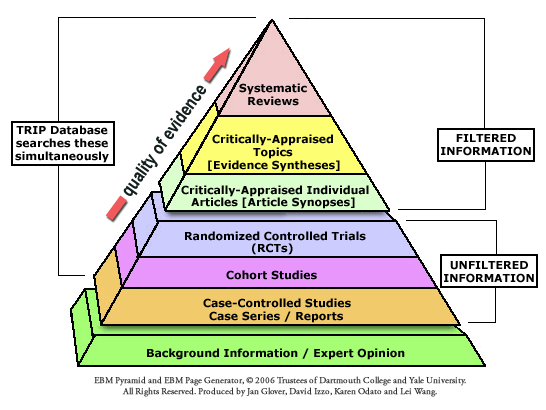
A systematic review is a high-level overview of primary research on a particular research question that systematically identifies, selects, evaluates, and synthesizes all high quality research evidence relevant to that question in order to answer it. In other words, it provides an exhaustive summary of scholarly literature related to a particular research topic or question. A systematic review is often written by a panel of experts after reviewing all the information from both published and unpublished studies. The comprehensive nature of a systematic review distinguishes it from traditional literature reviews which typically examine a much smaller set of research evidence and present it from a single author’s perspective.
Systematic reviews often use statistical techniques to combine data from the examined individual research studies, and use the pooled data to come to new statistical conclusions. This is called meta-analysis, and it represents a specialized subset of systematic reviews. Not all systematic reviews include meta-analysis, but all meta-analyses are found in systematic reviews. Simply put, a systematic review refers to the entire process of selecting, evaluating, and synthesizing all available evidence, while the term meta-analysis refers to the statistical approach to combining the data derived from a systematic-review. Conclusions produced by meta-analysis are statistically stronger than the analysis of any single study, due to increased numbers of subjects, greater diversity among subjects, or accumulated effects and results. Meta-analyses have become common in the social and biomedical sciences. However, some challenge the validity of meta-analysis, arguing that combining data from disparate studies produces misleading or unreliable results.
Systematic reviews and meta-analysis are situated at the top of what is known as the “Evidence Pyramid”. As you move up the pyramid the amount of available literature on a given topic decreases, but the relevancy and quality of that literature increases. Systematic reviews and meta-analysis are considered to be the highest quality evidence on a research topic because their study design reduces bias and produces more reliable findings. However, you may not always be able to find (or need to find) the highest level of evidence to answer your research question. In the absence of the best evidence, you then need to consider moving down the pyramid.

EBM Pyramid and EBM Page Generator, copyright 2006 Trustees of Dartmouth College and Yale University. All Rights Reserved.
Produced by Jan Glover, David Izzo, Karen Odato and Lei Wang.